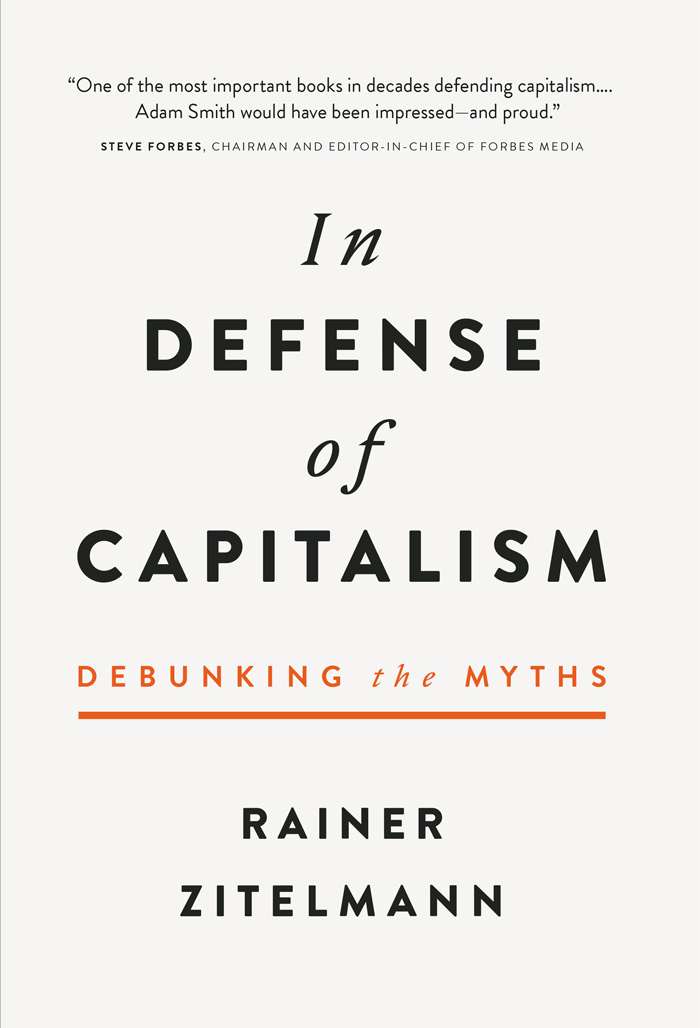Advanced Praise
“One of the most important books in decades defending capitalism. Well researched and well written, it not only makes the case for free markets but also demolishes Thomas Piketty’s much publicized tract trashing capitalism. Adam Smith would have been impressed—and proud.”
“Supporters of capitalism should keep a copy of In Defense of Capitalism close at hand wherever they are. Historian Rainer Zitelmann’s new book is full of interesting and convincing arguments that will not only make the reader understand that capitalism is the greatest invention in human history, but also equip them to counter the negative arguments against it. The many myths critical of capitalism are refuted with a wealth of facts and cogent arguments that the critics will not be able to effectively answer. Anyone who wants to know the truth about capitalism should read this book.”
“Capitalism has long been defined by its enemies. They mischaracterize it as cronyism, when the true logic of capitalism brings an end to unearned privileges and offers opportunities for all. This new book by Rainer Zitelmann answers a critical need, especially as illiberal politicians now blame capitalism for the misery they themselves created through interventionist economic policies. People all over the world need to stand up for capitalism as an engine of innovation and of rising living standards for all. Let us be grateful that In Defense of Capitalism provides a thorough review of the facts that make our case.”
“There are dozens of fashionable anti-capitalist platitudes which have reached the status of conventional wisdoms. Even though these are all profoundly wrong and ill-informed, some of them can be amazingly hard to counter in a debate, because anti-capitalists have a tendency to talk in clich.s, soundbites, abstractions and assertions, which are difficult to engage with in a rational way. As a result, they all too often go unchallenged, which further cements the anti-capitalist intellectual hegemony. In this book, Zitelmann provides the perfect antidote.”
“For well over 100 years people have been emigrating away from socialism to countries where there is more economic freedom and entrepreneurial opportunity. To capitalism, in other words. Even the Berlin Wall was not an airtight Venus flytrap for the East German socialists. Chances are, however, that you were taught the opposite in school—that capitalism is the source of virtually all human misery including poverty, pollution, war, and even fascism. In his book In Defense of Capitalism Rainer Zitelmann exposes the myths and superstitions that you were taught in school and provides you with a scholarly yet eminently readable explanation of economic reality. It is socialism that is the real ideological opiate of the masses that has caused the greatest miseries the world has known, as generations of immigrants have demonstrated by ‘voting with their feet’ (for capitalism and against socialism).”
“Rainer Zitelmann is already well known for his well-informed defence of capitalism and wealth accumulation. In this book, he uses international opinion poll data to understand different countries’ attitudes to capitalism and get inside the mind of anti-capitalists. From there he takes on ten of the most common misconceptions about capitalism and overcomes them with a powerful blend of arguments and hard facts.”
“Grab a pint with your friends and have a chat over current affairs. The chances are that if one of your friends talks about ‘capitalism’ (or ‘neoliberalism,’ for that matter), they are using the word as a short-cut for the status quo, and all that’s wrong with it. In this remarkable book, Rainer Zitelmann clears the confusion: capitalism doesn’t create poverty nor foreshadows war. Quite the contrary, actually.
Common misconceptions about capitalism are rooted less in empirical evidence than in the widespread hostility of intellectuals for an economic system which does not require their enlightened leadership to flourish. Zitelmann does not engage in the description of an ideal capitalism, but presents capitalism as it exists in our world. In capitalist economies, to a certain extent, common people have to decide their own economic future. Unleashing the ordinary person’s economic liberty, even if done very partially, tends to produce more wealth and improves the lot of most individuals way better than most elaborate government plans by Economics PhDs.”

Order online
secure and easy at: